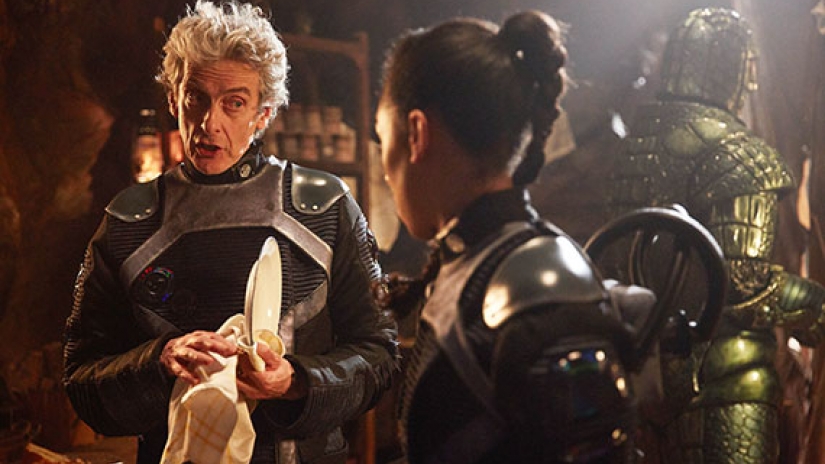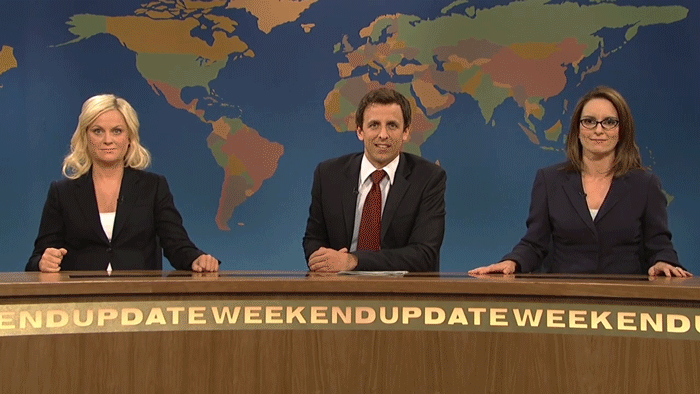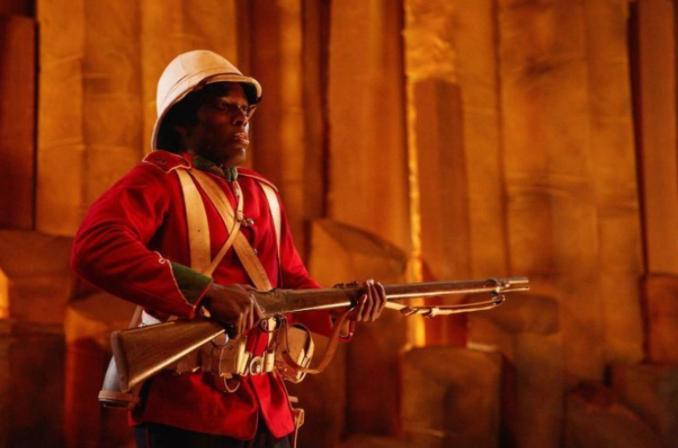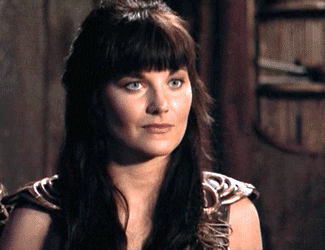Mark Gatiss Argued Against Diversity in the Casting of the Latest Doctor Who Episode
The BBC and Doctor Who showrunner Steven Moffat have been taking steps toward better representation on screen as of late so it’s weird one of their writers would have spoken out against a particular casting.
This weekend’s episode, titled “Empress of Mars,” featured Bayo Gbadamosi as Vincey, one of several Victorian soldiers stationed on Mars after discovering a ship belonging to the Ice Warriors on Earth. I actually thought it was nice to see some diversity in the episode which, again, took place on Mars. But not everyone agreed, apparently.
The Telegraph reports on episode writer and Sherlock co-creator speaking to students at Oxford University this past weekend:
The writer of Doctor Who has revealed how he protested against the “colour blind” casting of a black actor as a Victorian soldier in the BBC show.
Mark Gatiss said he was uneasy about a “brilliant young black actor” being cast as one of the soldiers, because “there weren’t any black soldiers in Victoria’s army”.
He put the decision down to the BBC’s drive to become “more representational and make everything less homogeneously white”.
Gatiss described the “very difficult” email he sent to a colleague explaining his feelings on the matter. It was only after he discovered records showing that there was in fact a single black soldier in Victoria’s army, that he accepted the decision.
Mark Gatiss: literally working against diversity on a sci-fi show where Victorian soldiers wind up on Mars with aliens.
It’s especially odd considering last year Moffat took a specific stance saying the show could do better in its casting (Pearl Mackie’s Bill was certainly a boon). “I had this baffling idea that if we just threw open each part to everybody, it would all work out in the end. I put my faith, inexplicably, in the free market,” he said. “It doesn”t work. You can only cast for talent – you’ve got to cast the best person, every single time – but you”ve got to gauge where you”re looking for the talent.”
Later that year he added, “It’s not something we’re looking for a pat on the back for, to be honest. People watching television, particularly children, should see people like them up there. That’s just a fact. That’s what should happen.” And indeed, his casting director Andy Pryor has been helping with this.
So it’s extra strange Gatiss admitted he wrote to colleagues about Gbadamosi’s casting saying, “This is very difficult email to send, but I don’t think we can do this…these are soldiers from the South African war, they’ve just been fighting the Zulus. There weren’t any black soldiers in Victoria’s army.” He then told the audience he did some research and found “the story of Jimmy Durham, a Sudanese boy who was rescued from the River Nile in 1886 and brought up by soldiers of The Durham Light Infantry regiment.” So then it was OK.
“I thought that was a very interesting dilemma, in terms of there are shows where you can be immediately more diverse and so you should be, and also times when it’s slightly more problematic,” Gatiss also said. Which is interesting because GLAAD has pointed out in the past, and I agree, that sci-fi and fantasy projects have a huge opportunity to showcase diverse talent. Moffat himself said this last year.
It’s a show that has no excuse. Sometimes the nature of a particular show – historical dramas, for instance – makes diversity more of a challenge, but Doctor Who has absolutely nowhere to hide on this. Young people watching have to know that they’ve a place in the future. That really matters. You have to care profoundly what children’s shows in particular say about where you’re going to be. And we’ve kind of got to tell a lie: we’ll go back into history and there will be black people where, historically, there wouldn’t have been, and we won’t dwell on that. We’ll say, ‘To hell with it, this is the imaginary, better version of the world. By believing in it, we’ll summon it forth.
Of course it’s also important to note just how much of the history that’s been written has completely erased the existence and contributions of many women and POCs, as Gatiss himself found out doing just a bit of research.
In other Doctor Who news, past showrunner Russell T. Davies admitted recently that he knows who the BBC has cast as the next Doctor but of course is keeping it to himself. That individual will take over for Peter Capaldi after he departs the series.
A few topical tweets on this have been making the rounds recently from Gene Demby:
“They shouldn’t make The Doctor a woman or POC to make some political point!”
Whiteness is not neutral. Maleness is not neutral.
— Gene Demby (@GeeDee215) June 11, 2017
Thirteen white dudes in a row playing a character meant to regenerate with a totally new identity every few years…is a political stance.
— Gene Demby (@GeeDee215) June 11, 2017




[…] 10 of Doctor Who has had some hits and misses but seeing lesbian, gay, and bisexual representation in one scene, and discussed in this manner, […]
It comes up like he was proud to make the stance against it, and then congratulating himself for only backing down once he, one HE personally, found a historical reason, unlike the people who wanted it who are just about politics, he alone cares for history??
like
hes boasting about not wanting diversity??
That’s what rubbed me the wrong way, that he was seemingly proud of taking that particular argument to them.
I could imagine Stephen Fry or any of our intelligent writers being sticklers for historical accuracy just as Gattis was being here. It’s unpleasant that doing so immediately results in the proverbial ton of bricks coming down on them. I don’t know why I’m contributing to this, I love Mark Gattis’s work. The internet is full of black holes. And I usually avoid pages with annoying GIF’s. It must have taken longer to find them than to write this article. Before you say “thanks for stopping by”, I will say “thanks for tempting me to waste 10 minutes of my time on earth on your page.”.
https://uploads.disquscdn.com/images/ff61db5120106dc80b8b003cc5deef022b1c80a511337eaed3ab8a0f44b21984.gif
I think once you put Victorians on Mars you have pretty much given up the ability to plead historical accuracy as an argument for anything! Having said that, to ignore how various groups in society interacted or behaved with one another during certain times and places in our world simply to create more palatable stories or characters is often unnecessarily distracting and can make an entire story premise lack credibility. As a woman of mostly European background for me it’s all about the Bechdel test. Scoring low on that always seemd to be a red flag for other problems. It’s a balance to be sure, and one which good writers who are both historically informed and socially conscious can manage and sometimes do, brilliantly (as the Marvel universe has recently, as Joss Whedon usually does and as Star Trek has for decades now, having been one of the first to show us how).
I don’t think Gatiss is against diversity. He’s against making the British colonial army look less racist than it was. During this period, racially integrated army units weren’t the norm. While you can make up sci-fi stuff as you go along, creative decisions to historical elements that have plenty of documentation is a lot more conspicuous & can undermine disbelief suspension.
The casting choice felt like an erasure of Imperial England’s racism, at least when combined with how underplayed the Zulu War backstory was. I commend the BBC’s casting for trying to be more inclusive, but this was an episode that could’ve actually hammered home that UK has made progress instead of acting like it always was forward thinking. Vincey could be an outlier like Jimmy Durham, but the script should’ve been rewritten to focus on that. Aside from some colorful phrases, the characters were all one-note. Seeing the situation from a character that’s out of place in both the regiment & Mars would’ve made the episode so much more interesting. The episode was pretty superficial in saying greed is bad without delving into how that colonial greed had ruined so many lives.
Overall I’d like Doctor Who to do more historical episodes set in places where the populations weren’t overwhelmingly white to begin with.
Very tough position he was in. One danger of changing historical references is that it could have the opposite of the desired effect. It’s like how some of the White Southerners in the U.S.A. want to remove slavery from text books and downplay historic bigotry. If we ignore the past – we tend to be doomed to repeat it and forget it’s lessons and it’s present day impact. The bigotry of the pre-21st century is still effecting communities of color today. We are not in a post-racial world. Acting like people of color were treated humanely in the 1800’s undermines the suffering and the impact that still echoes to this day. And though it’s a Sci-Fi show, it has tried to be accurate with regards to history previously as much of the show hinges on historic consistency – after all it is a time travel show. However, I don’t think casting a black actor as a Victorian Soldier on Mars was that big of a problem but I can see where he was concerned. I don’t take his comments as not being progressive at all however – I believe he was intending on trying to make sure we don’t wash history of all of it’s unpleasantness and as a result, disrespecting it’s impact.
And I feel as if the writer of this blog is not aware of past companions on the show being diverse – certainly since the 2005 “reboot”. Bill being black is not new. Her being gay is not even that new for the show. (Captain Jack Harkness was bi-sexual and hit on the Doctor constantly) But since 2005 we’ve had Martha Jones, Mickey and Danny.
Additionally – the Doctor’s also not been that central or only timelord on the show. There’s River Song and Missy and even in the past few seasons we saw Jenna Coleman’s character become a full fledged TARDIS owning Timelord-like character. In fact often, since the 2005 reboot, the companions have been the real central characters -driving the storyline and not just being hapless companions. The 9th and 10th Doctors were basically shows about Rose Tyler. Matt Smith’s 11th/12th Doctor was essentially, for most of his run, about Amy Pond as was most of Jenna Coleman’s run. Much of Freema’s storyline was her as the central character protecting the Doctor (she walked the world to save him and humanity). In fact I think this season, with Bill, is the first time in some time where The Doctor is the central character and the companion simply an add on in a supporting fashion.
Here’s a breakdown of 2005-2017 companions and how many episodes they were in:
Jenna Coleman (Clara) 39
Karen Gillan (Amy) 37
Billie Piper (Rose) 39
Arthur Darvill (Rory) 27
Freema Agyeman (Martha) 24
Catherine Tate (Donna) 18
Noel Clark (Mickey) 15
Matt Lucas (Nardole) 14
Pearl Mackie (Bill) 13 (and counting I believe)
John Barrowman (Captain Jack Harkness) 13
Samuel Anderson (Danny) 11
And though the longest running companions are white, both Jenna and Billie’s love interests were not and they were often on the show or even, with Danny, a big part of the season’s arc. Freema was in the fourth most episodes of any of the main companions and took up nearly half of David Tennant’s 59 episode run as the Doctor. ( he is the second longest serving Doctor since the 1970’s 4th Doctor (Baker)).
That being said it is long overdue for a female or non-white Doctor. Long long long overdue. And there has been a lack of other minorities as well such as Indian and say, Chinese etc. which given Britain’s former “empire” you would think they would have a bigger presence on the show.
I can see the point, I just don’t know if it needed making. It’s nice that he was trying to maintain historical accuracy in a story where there were Victorian soldiers on Mars. I rather liked that the casting was not addressed at all, much in the same way the casting of a little person two weeks had no relevance to the plot at all.
So Mark, who as you point out actively supports increasing diversity on TV, speaks candidly on the difficulties he has encountered in reconciling this progressiveness with desire for historical accuracy, and gets a character assassination for his trouble. You may not subscribe to his exact viewpoint on that tension, but he is still fundamentally and wholeheartedly on the right side of the debate. I find the tone of this article (not to mention its condescending GIFs) deeply unpleasant. Would you not rather encourage discussion instead of slamming the door on it??
“who as you point out actively supports increasing diversity on TV”
I said Moffat is actively supporting increasing diversity, I’ve never found Gatiss to be particularly progressive. And I believe my tone is appropriate for 2017.
Well all I can say is if the grand aim is for only one point of view to be considered acceptable, for any debate or slight deviation to be pounced on and shut down by gutter press tactics (note: these don’t magically become OK when utilised by the left), that’s not the 2017 I want.
Thanks for stopping by.
Thanks for stopping by.
Mmmm-mmm-mmmm, taste that tone policing! Spicy!